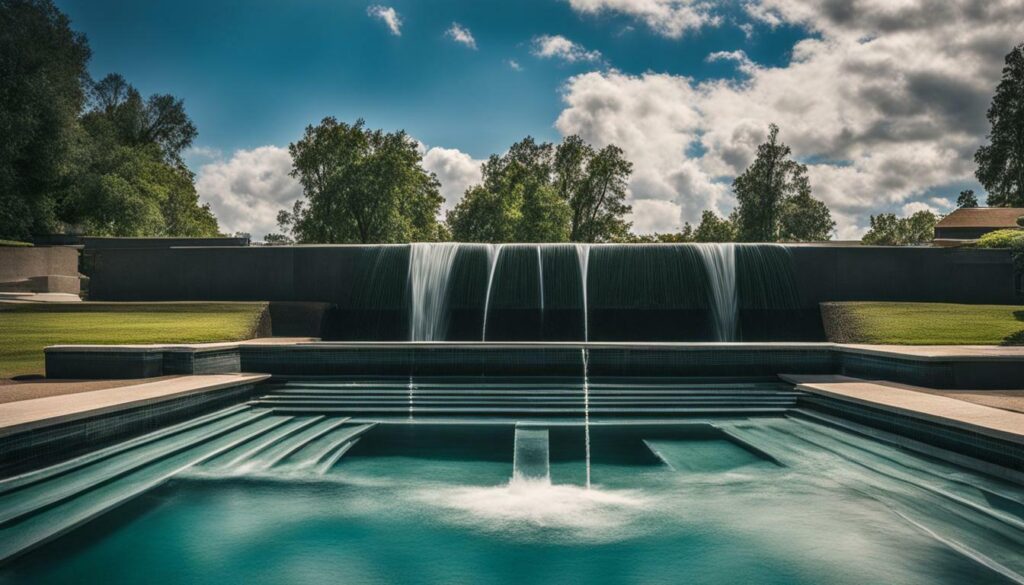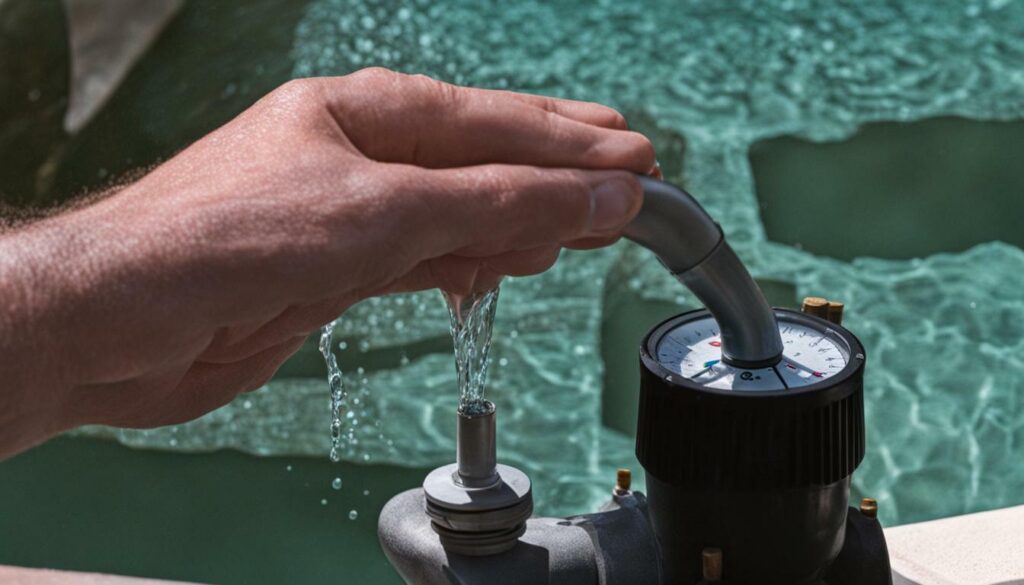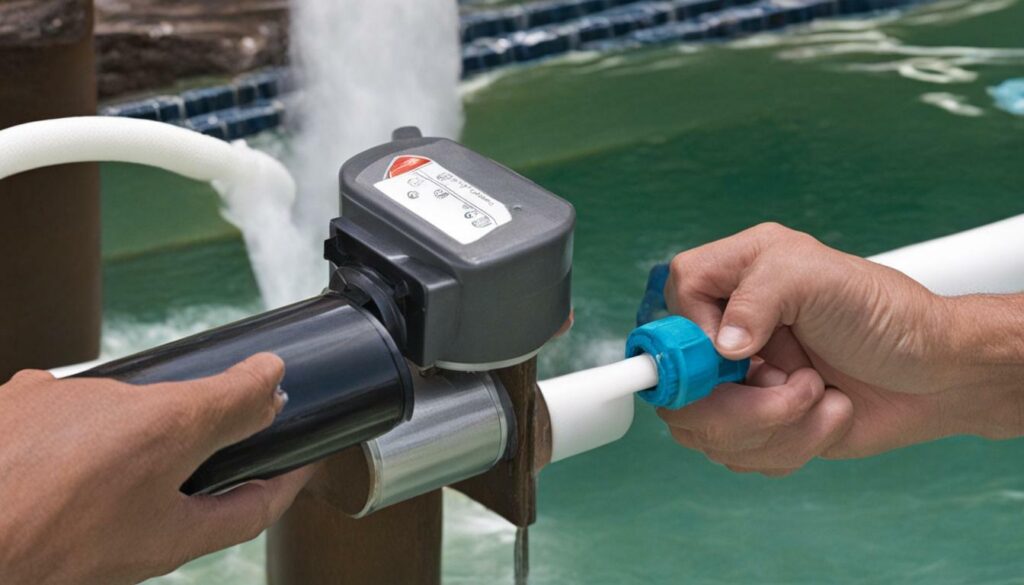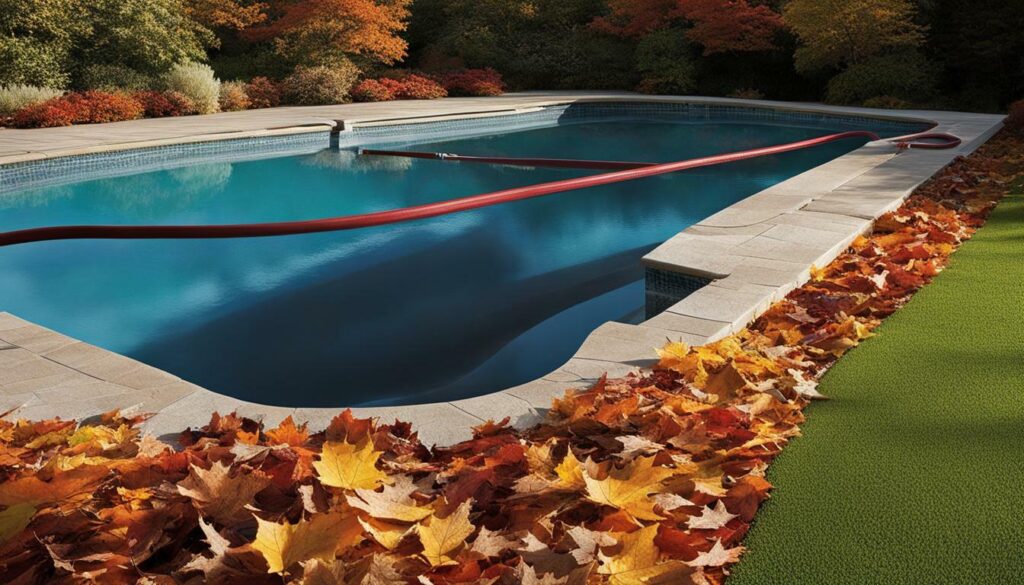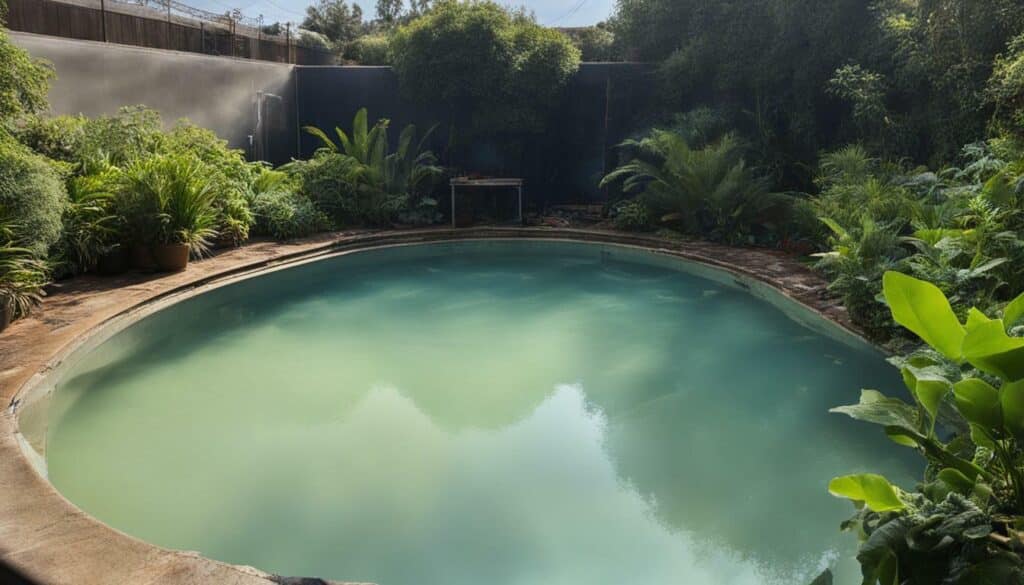
As a pool owner, there’s nothing more frustrating than a cloudy pool. You’ve done all the necessary steps: testing the water, adding shock, and waiting for the magic to happen, yet the water remains hazy. Why is your pool still cloudy after shocking it?
Unfortunately, there isn’t always a straightforward answer to this question. Cloudy pool water can be caused by a variety of factors, and shock treatment doesn’t always clear it up right away. However, understanding the common culprits can help you get to the bottom of the issue and get your pool back to its crystal-clear state.
- Cloudy pool water can be caused by various factors and is not always cleared up by shock treatment.
- A balanced pool chemistry, adequate filtration, and proper circulation are crucial in achieving a clear pool.
- Additional steps, such as backwashing and using clarifiers or flocculants, can complement the use of pool shock to clear cloudy pool water.
- Regular pool maintenance and preventive measures can help avoid cloudy water in the first place.
- Professional assistance may be necessary in identifying complex issues that require the expertise of a pool professional.
Factors that Affect Pool Clarity
When it comes to maintaining a clean and clear pool, shock treatment is often the go-to solution for many pool owners. However, there are a variety of factors that can contribute to cloudy water, which may prevent shock treatment from being effective.
In this section, we’ll explore the factors that affect pool clarity and why they can impede the effectiveness of pool shock in clearing the water.
| Factors | How They Affect Pool Clarity |
|---|---|
| Inadequate Filtration | When the filtration system is unable to remove all of the debris and contaminants in the water, the remaining particles can contribute to cloudiness. |
| Imbalanced Chemicals | When pH, alkalinity, and sanitizer levels are not properly balanced, they can create conditions that lead to cloudiness. |
| High Levels of Organic Matter | Organic matter such as leaves, grass, and algae can cause cloudiness if they are not removed promptly and properly. |
| Insufficient Circulation | If the pool water is not adequately circulated, dead spots can form where debris and contaminants accumulate, leading to cloudiness. |
It’s important to note that all of these factors can occur simultaneously, making it even more challenging to achieve clear water. When any of these issues are present, they can significantly impede the effectiveness of pool shock in clearing the water.
In the following sections, we’ll look at how proper water chemistry, filtration, and circulation can overcome these issues and support the effectiveness of pool shock.

Clearing cloudy pool water after shocking requires more than just adding shock to the water. One of the most critical factors in achieving a clear pool is maintaining proper water chemistry. When the chemical balance is off, it can impede the effectiveness of shock in clearing the water, leaving your pool still hazy after shocking.
Optimal levels of pH, alkalinity, and sanitizer are essential in achieving crystal clear water. pH measures the acidity of the water, with the ideal range being between 7.4 and 7.6. When pH levels are too low, the water becomes acidic, which can cause corrosion and skin irritation. Conversely, high pH levels make the water alkaline, leading to cloudiness and scaling.
Alkalinity refers to the ability of pool water to neutralize acid. The ideal alkalinity level is between 80 to 120 parts per million (ppm). When the alkalinity is too low, it leads to pH fluctuations and corrosion, while high alkalinity levels cause scaling.
Sanitizer levels, such as chlorine or bromine, are necessary for killing bacteria in the pool water and maintaining water clarity. Ideal levels of sanitizer are between 1 and 3 ppm for chlorine and between 3.0 and 5.0 ppm for bromine. Too low sanitizer levels may cause cloudy water, while too high may lead to skin and eye irritation.
By maintaining proper water chemistry, you can ensure the effectiveness of shock in clearing cloudy pool water. If you’re wondering how to clear cloudy pool water after shocking or why your pool water is still hazy after shocking, start by testing your water chemistry and adjusting it accordingly.

If your pool remains cloudy after shocking, inadequate filtration and circulation might be the culprit. Without proper filtration, your pool shock won’t be able to kill all the bacteria and algae in the water. In addition, poor circulation can prevent the shock from reaching all areas of the pool.
To fix this issue, you need to make sure that your filtration system is working correctly. Check your filter and pump to ensure they are clean and free from debris. You may need to backwash or clean your filter to improve circulation. Additionally, ensure that your pool jets are pointing in different directions to improve water movement.
It is also important to run your pool pump long enough to ensure that all the water in your pool is filtered. The recommended pump run time is 8-12 hours per day, depending on the size of your pool. If you have a timer, make sure it is set correctly.
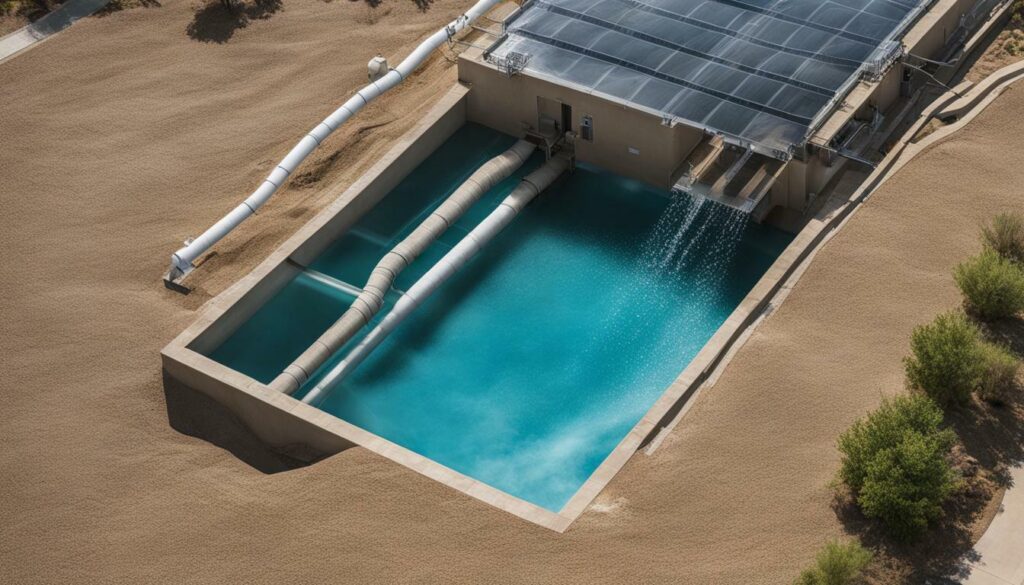
By optimizing your filtration and circulation, you will enhance the effectiveness of your pool shock to clear cloudy water.
Understanding the pool shock process
Pool shock is a powerful tool in clearing up cloudy or green pool water, but it is important to understand the process and manage expectations regarding its effectiveness.
Many pool owners may wonder why their pool water is still green or cloudy even after adding shock. The truth is that pool shock is not a magical solution that will instantly transform murky water into sparkling clarity.
Firstly, it is important to note that if your pool is still green after shock treatment, it may be indicative of an algae infestation that requires additional treatment.
As for cloudy water, it may take several days for the shock treatment to fully work and clear up the water. The time it takes for the pool to clear after shocking depends on several factors, such as the severity of the cloudiness, the type and amount of shock used, and the pool’s filtration and circulation system.
It is also important to use the correct type and amount of pool shock, as different situations may require different types of shock to be effective. Some types of shock require pre-dissolving or a certain pH level to work optimally.
Ultimately, the key to successful shock treatment is to address the underlying causes of cloudy or green pool water, such as inadequate filtration, imbalanced chemicals, and high levels of organic matter. It is important to regularly test and balance the pool’s water chemistry, maintain proper filtration and circulation, and address any debris or algae buildup promptly.
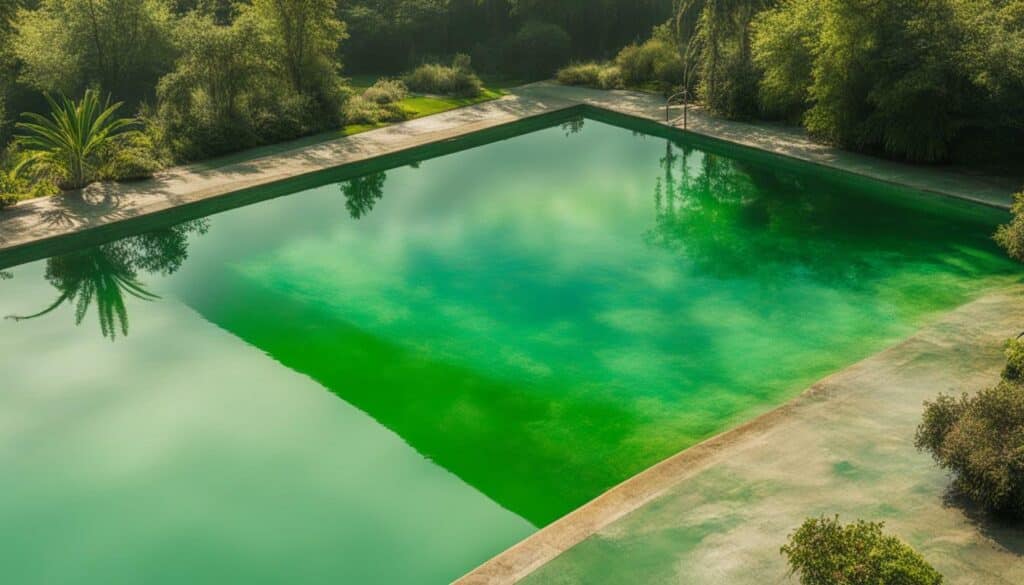
By understanding the pool shock process and taking proactive steps to maintain pool health, pool owners can achieve and maintain a clear and inviting swimming pool.
Additional steps to clear cloudy pool water
If your pool is still cloudy even after shocking it, there are several additional steps you can take to help clear the water. These measures can complement the use of pool shock and speed up the clearing process.
Perform a Backwash: Backwashing your filter can help remove any debris or contaminants that are hindering the filtration process. This is especially important if the filter pressure is high or if you notice any build-up in the filter.
Deep Cleaning: Deep cleaning your pool can also help clear cloudy water. This involves scrubbing the pool walls and floor, cleaning debris from the waterline, and removing any visible dirt or grime. This helps improve the overall water clarity and makes it easier for the filtration system to do its job.
Use Clarifiers or Flocculants: Clarifiers and flocculants are chemical agents that help remove small particles from the water by coagulating them into larger clumps that can be easily filtered out or vacuumed up. Clarifiers work slowly over time, while flocculants work quickly but require manual removal of the clumped particles.
| Tip: | When using clarifiers or flocculants, it’s essential to follow the manufacturer’s instructions carefully and to monitor the chemical levels closely to avoid any adverse effects on your pool’s water chemistry. |
|---|
By taking these additional steps and combining them with the use of pool shock, you can significantly improve the water clarity and get your pool back to its sparkling best.

Prevention is key
Preventing cloudy pool water is much easier than dealing with it once it occurs. Regular pool maintenance is essential for keeping the pool clean and clear. Here are some tips to prevent cloudy pool water:
- Skim the pool regularly to remove debris such as leaves, insects, and other organic matter that can contribute to cloudiness.
- Brush the walls and floor of the pool to remove any algae or other buildup on the surface that can cause cloudy water.
- Make sure to test and balance the pool chemistry regularly to ensure that pH, alkalinity, and sanitizer levels are within the recommended ranges.
- Clean the filter and ensure proper circulation to prevent debris from accumulating in the pool and causing cloudiness.
- Use a pool cover to prevent debris from entering the water when the pool is not in use.
By following these simple steps, you can prevent cloudy pool water and enjoy a crystal-clear pool all season long.

Seeking Professional Assistance
While it is possible to clear a cloudy pool on your own, there are some situations where it may be necessary to seek professional assistance. If you have tried all the recommended steps, including shock treatment, filtration optimization, and water chemistry balancing, and your pool is still hazy, it may be time to call in a pool professional.
A pool professional can help you identify complex issues that may be contributing to your cloudy water problem. For example, equipment malfunctions like a faulty pump or filter can prevent proper water circulation and filtration, leading to persistent cloudiness.
If you are experiencing persistent water quality problems despite your best efforts, a pool professional can also help you diagnose the underlying causes. They can provide expert advice on how to maintain proper water chemistry, keep your pool clean, and prevent excessive debris from entering the pool in the future.
Remember, seeking professional assistance can help you save time, money, and frustration in the long run. Don’t hesitate to seek out the help of a qualified pool professional if you need it.
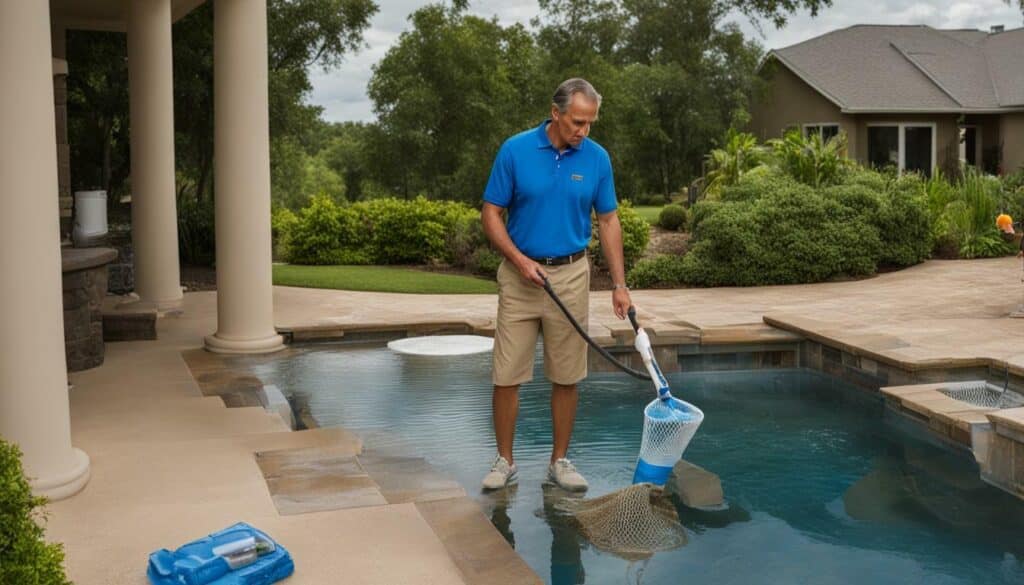
Maintaining a clean and clear pool requires ongoing attention and effort. Here are some practical tips to help you keep your pool in top condition:
- Skim the water: Use a net or skimmer to remove any debris such as leaves or bugs that collect on the surface of the pool. Doing this regularly can help prevent these items from sinking to the bottom and clogging up your filtration system.
- Clean the walls and floor: Brush the walls and floor of your pool at least once a week to remove any dirt or algae buildup. This will prevent it from becoming a larger problem and will help to keep your pool looking its best.
- Test and balance the water: Regularly test your pool water to ensure that it is balanced in terms of pH, alkalinity, and chlorine levels. By keeping these levels within the appropriate range, you can prevent algae growth and other water quality issues from occurring.
- Backwash the filter: To keep your filtration system working properly, it’s important to regularly backwash your filter. This process removes any built-up dirt or debris that is trapped in the filter, allowing it to function more efficiently.
- Check the circulation: Make sure that your pool’s circulation system is working properly and that water is being circulated throughout the entire pool. This can help to prevent stagnant water and potential algae growth.
By following these regular pool maintenance tips, you can keep your pool clean and clear all season long.
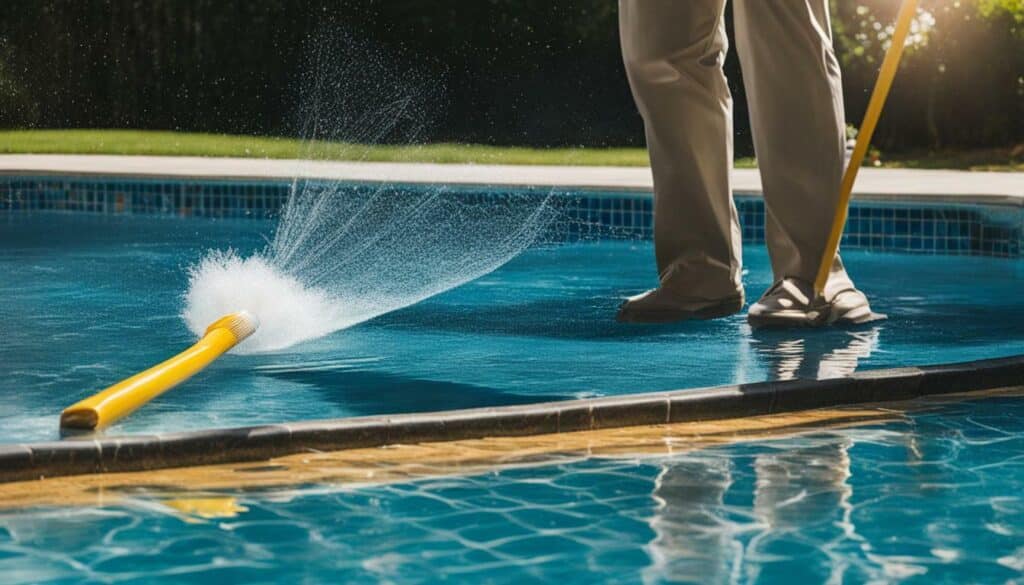
Keeping a swimming pool clear and sparkling can be a challenge, especially when faced with cloudy water even after using shock. However, by understanding the underlying causes of cloudiness and taking the appropriate measures to address them, pool owners can enjoy a beautiful and refreshing pool all season long.
Remember to maintain proper water chemistry by testing and adjusting pH, alkalinity, and sanitizer levels regularly. Keep the pool clean by skimming, brushing, and vacuuming, and ensure optimal filtration and circulation. Don’t forget to perform regular backwashing and deep cleaning to remove any accumulated debris.
When to seek professional help
If you’re experiencing persistent water quality problems or suspect equipment malfunctions, it may be time to seek the help of a pool professional. They can diagnose complex issues and recommend appropriate solutions to get your pool back to its crystal-clear state.
By following these tips and staying vigilant with regular maintenance, you can enjoy a clean and clear pool all season long. Happy swimming!
FAQ
Q: Why is my pool still cloudy after shocking it?
A: There can be several reasons why your pool may remain cloudy even after shocking it. It could be due to factors such as inadequate filtration, imbalanced chemicals, high levels of organic matter, or insufficient circulation.
Q: What are the factors that affect pool clarity?
A: Factors that can impact pool clarity include inadequate filtration, imbalanced chemicals, high levels of organic matter, and insufficient circulation. These factors can prevent pool shock from effectively clearing the water.
Q: Why is proper water chemistry important in clearing cloudy pool water?
A: Maintaining proper water chemistry is crucial for achieving a clear pool. Imbalances in pH, alkalinity, and sanitizer levels can contribute to cloudiness even after shocking the pool.
Q: How can proper filtration and circulation help clear cloudy pool water?
A: Effective filtration and circulation play a significant role in clearing cloudy pool water. Optimizing your filtration system and ensuring adequate circulation can enhance the effectiveness of pool shock.
Q: How does the pool shock process work?
A: The pool shock process involves adding chemicals to your pool to eliminate bacteria, algae, and other contaminants. It’s important to understand that immediate results may not occur, and it may take some time for the pool to clear after shocking.
Q: What additional steps can I take to clear cloudy pool water?
A: In addition to using pool shock, you can perform a backwash or deep clean your pool, use clarifiers or flocculants, and ensure proper maintenance to speed up the clearing process.
Q: How can I prevent cloudy pool water?
A: Regular pool maintenance and preventive measures are key to avoiding cloudy water. Tips include maintaining proper water chemistry, keeping the pool clean, and preventing excessive debris from entering the pool.
Q: When should I seek professional assistance for clearing a cloudy pool?
A: If you’re facing complex issues or persistent water quality problems, it may be necessary to seek the expertise of a pool professional. They can help identify and address equipment malfunctions or other underlying issues.
Q: What are some regular pool maintenance tips?
A: To maintain a clean and clear pool, tasks such as regular skimming, brushing, testing and balancing water chemistry, and ensuring proper filtration and circulation are essential.
Q: What is the conclusion of this article?
A: The main points discussed in this article emphasize the importance of addressing the underlying causes of cloudy pool water. Regular pool maintenance, proper filtration and circulation, and maintaining proper water chemistry are key to achieving and maintaining a crystal-clear pool.

